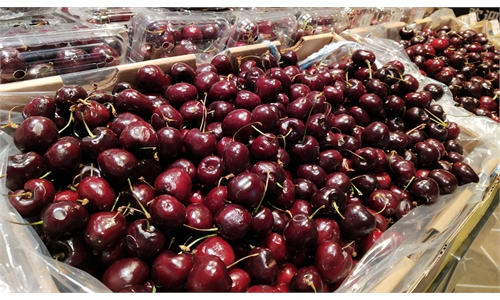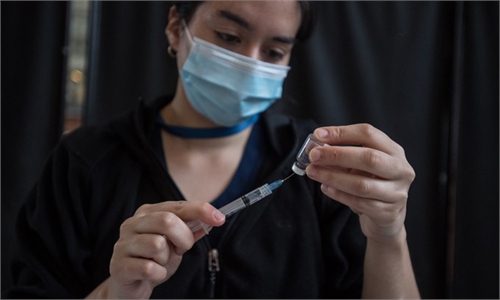China-Chile trade to reach record high in 2021 despite global headwinds: envoy
Bilateral trade in 2021 expected to surpass $55 billion to a record high: envoy

Boxes of cherries imported from Chile are sold in a supermarket in Nanchang, capital of East China's Jiangxi Province in February 2021. Photo: cnsphoto
While the pandemic continues to disrupt supply chains creating unprecedented challenges for international trade, economic cooperation between China and Chile, two countries that are geographically far apart, is expected to hit a record high by surpassing a $55 billion threshold, according to a recent forecast by the Chilean Ambassador in Beijing, Luis Schmidt.
The ambassador's prediction is not unfounded. Driven by an upgraded Free Trade Agreement (FTA) and strengthened cooperation under the Belt and Road Initiative (BRI), bilateral ties have proven highly resilient.
China now accounts for 38.2 percent of Chilean exports, a milestone achievement compared with Chile's second- and third-largest trading partners - the US (16.5 percent) and Japan (7.7 percent), the Chilean envoy told the Global Times in an exclusive interview on Wednesday.
While China remains Chile's major trading partner, Chile has become China's major supplier for a range of goods and commodities ranging from copper ore and molybdenum to fresh cherries, grapes and plums.
One signature product from Chile gaining popularity in the Chinese market is fresh cherries. Between January and October 2021, fresh cherry exports to China reached $1.266 million, up 84 percent year-on-year.
Additionally, Chile is expected to consolidate positive momentum for bottled wine exports, with the South American nation rising from being the third-placed supplier to second place in the Chinese market both in terms of value and volume, Schmidt said.
In the first 10 months of 2021, overall trade exchange between the two countries reached $51.51 million, a jump of 45 percent year-on-year, according to the Chilean Embassy in Beijing.
If Chile's trade with China can top $55 billion this year, it means that its trade volume will account for one sixth of China-Latin America trade volume, ranking second in the region after Brazil, Bu Shaohua, deputy director of the Department of Latin American and Caribbean Studies at China Institute of International Studies, told the Global Times on Wednesday.
Strengthened bilateral trade growth has been largely attributed to a bilateral FTA under which many goods are able to enjoy zero tariffs and competitive pricing, experts said.
Over the last decade, Chilean shipments of goods and commodities to China have grown by 182 percent, and since the implementation of the FTA, bilateral trade has grown on average by 15.7 percent on an annual basis, according to Schmidt.
Leveraging the rapid development of China's e-commerce sector, Chilean products become popular on major Chinese consumer platforms such as Tmall, JD.com, Fresh Hippo, and Pinduoduo, reaching a wider range of consumers.
"We were granted market access to sell a number of new product categories in the Chinese market in November this year, among which there is a new protocol we signed for frozen fruits," the ambassador said, noting that they are also working closely with Chinese authorities on initiating several new product categories, such as for bovine and ovine related products, and a number of other protocols specific to the seafood and dried fruits sector.
"The positive trade growth experienced by both countries is in part thanks to the profound bilateral cooperation that has been built up over our 50 years of uninterrupted diplomatic relationships," the ambassador said.
Several milestones that have shaped the bilateral relations, including the fact that Chile was the first South American country to establish diplomatic relations with China in 1970, and the first country outside Asia to sign the FTA with China in 2005.
One of the most positive areas of the bilateral cooperation has been the joint battle against COVID-19, which the ambassador said has allowed Chile to better cope with the spread of the virus and played a role in helping the country meet its vaccination goals.
Sinovac has sent over 25 million doses of CoronaVac to Chile. Separately, the country has an agreement with CanSino to supply 1.8 million doses of vaccine, of which 31 percent has already been delivered, Schmidt said.
Furthermore, on August 4, Sinovac laboratories announced its intent to invest in Chile and build a vaccine production plant in the Metropolitan Region in central Chile to produce 60 million doses of vaccines per year, which is expected to be operational by the second half of 2022. Sinovac will also develop a research and development center in the Antofagasta Region.
"Both projects allow Chile and Latin America to be better inserted in the global vaccine production chain and have a stable supply," Schmidt said.
Foreign direct investment (FDI) from China to Chile has remained dynamic and diversified. Cumulative Chinese investment in Chile amounts to approximately $13 billion, which represents around 9 percent of the total amount of FDI in Chile, in which the BRI plays a booster role.
"Chile considers that the BRI plays an important role in our bilateral relations. Likewise, cooperation in this multilateral initiative makes an important contribution to collaboratively confront the current challenges of the pandemic, and will be essential for post-pandemic recovery," the ambassador said.



